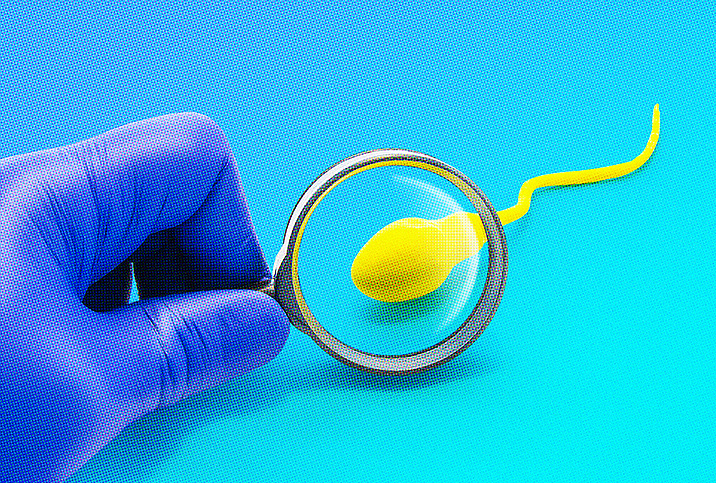21st-Century Male Fertility Threats We Need to Study Further

The decisions you make today may have a lasting impact on your future children and grandchildren, with some choices even eliminating their chances of being born. Fertility is complicated, and those complications can behave like spiderwebs stretching out across the generations.
To make optimal decisions, men need optimal information about sperm quality, the process of impregnation and how genetics are handed down from father to child.
For too long, the focus on fertility issues has primarily or exclusively been on female factors. Yes, our understanding of pregnancy has evolved and our ability to perceive the nuances of conception has expanded. Various social constructs, inherent biases and components of medical infrastructure worldwide, however, have prevented scientific communities from developing practices that provide the male half of the fertility equation with equal resources and data.
"What I'll tell you is that just to routinely get a semen analysis or a sperm count check, just to know, is really not terribly useful," said Matthew Mutter, M.D., a urologist in Metairie, Louisiana. "And what I mean is that outside of the context of a fertility workup—so just a random guy thinking, 'Oh, I wonder what my sperm count is'—that's not going to provide him with a whole lot of usable data as it applies to a pregnancy, right? Because what we want to associate sperm counts with is fertility."
Sperm count and sperm quality discussions have become more regularly incorporated into the research and dialogue regarding fertility concerns, but there remains a number of areas in which further exploration is needed.
Fortunately, doctors, researchers and fertility specialists are beginning to dive into that research now.
Advanced paternal age factor and epigenetics
Age plays a critical role when it comes to the quality of sperm and the ability of a man to conceive a child through intercourse. While age-based deteriorations to sperm count or quality are less clear-cut than the parallel age limitations found in women in the form of egg count and quality, emerging research is revealing that advanced age on the paternal side can impact not only the immediate pregnancy, but also generations to come.
"We think that in men, after the age of 40 to 45, there can be diminished quality of sperm. And that's something that we see with increasing rates of learning disorders and autism-spectrum disorders, and in increased rates of syndromes, in the offspring born either of parents when they were at an advanced paternal age or even in their grandkids," said Amin Herati, M.D., the director of Male Infertility and Men's Health at Johns Hopkins Hospital in Baltimore. "So the ripple effects are significant and that's something that we're recognizing—the pervasiveness of some of these epigenetic changes that occur in the sperm related to the advanced age."
Epigenetics, an important field of science for understanding fertility issues from any point on the gender spectrum, is particularly useful in evaluating long-term or intergenerational concerns regarding conception throughout time and along particular genetic lineages.
Epigenetics looks at gene expression rather than the fixed genetic code itself. This is something of an oversimplification, but basically, epigenetic changes are what determines whether a gene is turned "on" or "off."
Another way to think of it: If geneticists study the foundations and structural components of a house (our biological makeup), then epigeneticists look at the decorations hanging from the walls. Generally, the house is handed down from parent to child without much alteration, but one generation might remove a painting from a wall or redecorate a space inside or outside the house without necessarily altering the structure. And those old paintings sitting in the attic can always be brought out and placed on the wall again.
Gene structure and gene expression are much the same as the bones and decorations, respectively, of the house. Gene structure is more fixed and changes only gradually over time. Gene expression can be altered by the actions or behaviors of an existing generation, or it can be passed down to the next.
Environmental exposure concerns
Risk of exposure to harmful elements plays a key role in examining male infertility. Workplace environments and occupational hazards can contribute significantly to the levels of radiation, chemical agents and toxicants, or even simpler threats, such as severe temperatures and poor air quality.
"What we're also finding is that whenever there is exposure—environmental exposures—those exposures can also affect the DNA markings, so the epigenetic changes that can occur will last long-term into many, many, many generations," Herati said.
As researchers learn more about the genetics and epigenetics of sperm and the way it affects multigenerational families, they know men might be able to assert a degree of control over some immediate factors, according to Herati.
"Things that would contribute to DNA damage [in sperm] would be the presence of varicose veins, environmental factors, such as occupational exposure, or exposures like chemotherapy and radiation, and things that they're doing, such as cigarette smoking, and medications that they're taking," he said.
Herati revealed that unpublished environmental research from his lab looked at the impact of air quality and the changes that have occurred during the COVID-19 pandemic.
"We found that when air quality was better, semen parameters were better," he said, adding that an improvement in air quality throughout the world during the pandemic provided a unique opportunity for study by the team at James Buchanan Brady Urological Institute at Johns Hopkins University School of Medicine.
It may not be terribly surprising to find out that better air quality means better sperm quality, but Herati's lab is looking at some interesting and focused research examining various components of sperm quality and the factors that might improve or deteriorate it.
He was even willing to share some bits of information from research that hasn't been published yet. For example, when people were attending parks more during the pandemic, their sperm quality was also better. Simple activities such as exercise and outdoor ventures can be linked to improved sperm motility, and whether a couple tries to conceive in an urban or rural setting can even make a difference.
Ejaculatory damage to sperm DNA
While ejaculation may be one of the more pleasurable bodily functions for people with a penis, genetic carriers don't enjoy it so much. Sperm actually undergo a certain amount of damage during the process of ejaculation.
"DNA damage has been studied at different levels of the reproductive tract," Herati said. "So we know that the amount of DNA damage—what's called DNA fragmentation—increases as the sperm leave the testicle going to the epididymis and up the vas deferens. And then it picks up a lot of damage as it's exiting the urethra. Through the process of ejaculation, the shearing forces of ejaculation impart a lot of stress on the DNA."
Herati explained that doctors and researchers can extract sperm from the testicle, thereby forgoing the DNA-damaging process of ejaculation. But the extracted sperm hasn't gone through the same "quality control" that would normally take place in order for the sperm to exit the testicle, he said. Testicular sperm extractions create a bit of a trade-off, but in some cases where there is extreme DNA damage to the sperm, testicular extraction can be used for fertility procedures.
These facts indicate there are many layers to the answers that surround male fertility questions. It's clear that men and their partners need more comprehensive education on matters such as hormone circulation, semen potency and the possible root causes of specific symptoms in men.
"Recently—and when I say recently, I mean over the past several years—testosterone replacement has been somewhat in vogue, if you will," Mutter said. "Everybody wants to know their testosterone levels. A lot of guys are looking at testosterone levels as an explanation for their symptoms, whether it be fatigue or not being able to lift as much in the gym or what have you. Something to be very concerned about as it ties into sperm count and fertility—and this is not a very well-known thing outside of urology—is that the use of exogenous testosterone will virtually eliminate your sperm count."
As evidence, Mutter pointed to the fact that researchers in China were looking at very, very low doses of testosterone in injectable form as a method of male birth control.
"It's not uncommon to get a young man into the office for a fertility evaluation and have them tell you that they've been on testosterone, either exogenously in high school because they wanted to lift more weights, or even [because] some providers who are not very familiar with testosterone replacement may do that in the hopes of improving fertility," he said. "And, in fact, it actually is quite the opposite. Depending on how long you're on the testosterone, it will vary how long it will take for your body to rebound the sperm count. Unfortunately, some men will never rebound [to] a sperm count that will equate into a pregnancy."
Fertility is complicated. Research is trying to make it less so.


















